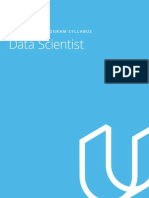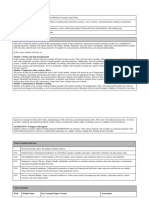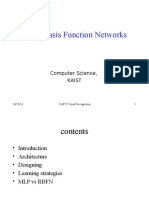Python for Data Science and AI_ Program Outline
Uploaded by
umarbusinge6Python for Data Science and AI_ Program Outline
Uploaded by
umarbusinge6Python for Data Science and AI: 3-Month Program Outline
Program Overview
This 3-month program is designed to provide a comprehensive, in-depth learning experience in Python for
Data Science and AI. Participants will progress from foundational concepts to advanced techniques,
culminating in real-world capstone projects that demonstrate their newly acquired skills. The program
combines interactive live sessions, hands-on assignments, and personalized mentorship to ensure thorough
understanding and practical application.
Program Goals
● Master Python programming for data science applications.
● Build proficiency in data manipulation, visualization, machine learning, and AI.
● Develop a strong portfolio through real-world capstone projects.
● Gain practical experience and problem-solving skills for industry readiness.
Structure
Duration: 12 Weeks
Mode: Virtual (Live sessions + Recorded resources)
Time Commitment: 5–10 hours/week
Components: Live instruction, hands-on assignments, capstone project, and mentorship
Week 1: Python Foundations for Data Science
● Python syntax and constructs
● Data structures: Lists, Tuples, Sets, Dictionaries, and their performance considerations
● Control flow: Conditional statements and loop optimizations
● Writing modular code: Functions, modules, and package creation
● Error handling and debugging
Week 2: Environment Management and Package Ecosystem
● Virtual environments: Best practices with venv and conda
● Dependency management and environment reproducibility
● Package management: pip, poetry, and conda-forge
● Jupyter Notebook extensions and interactive dashboards
● Introduction to integrated development environments (IDEs) with configurations
AI for Uganda Initiative
www.aiforuganda.org | @ai4ug | info@aiforuganda.org
Empowering the next generation of innovators in Uganda through practical learning and AI systems development
Week 3: Data Manipulation and Analysis
● Data manipulation with Pandas
● Pandas functionalities: MultiIndex, groupby operations, time series handling
● Efficient data processing with Dask for large datasets
● Data cleaning and imputation techniques
● Data merging and reshaping for complex analyses
Week 4: Data Visualization Techniques
● Matplotlib and Seaborn for data visualizations
● Interactive visualizations with Plotly and Bokeh
● Customizing plots for publication quality
● Best practices in visual data storytelling
● Saving, exporting, and integrating visualizations into reports and dashboards
Week 5: Statistical Methods in Data Science
● Descriptive statistics: Measures of central tendency, dispersion, and distribution analysis
● Inferential statistics: Hypothesis testing, confidence intervals, and p-values
● Correlation and Regression analysis: Linear and non-linear models
● Statistical significance and its implications in machine learning
● Topics in probability and distributions
Week 6: Mathematical Foundations for AI
● Linear algebra: Eigenvalues, eigenvectors, SVD
● Calculus: Partial derivatives, Jacobian and Hessian matrices, and their role in optimization
● Probability theory: Bayes theorem, Markov chains
● Statistical methods for high-dimensional data
● Introduction to optimization techniques for machine learning
Week 7: Machine Learning Algorithms
● Supervised learning: Regression models, decision trees, ensemble methods
● Unsupervised learning: Clustering techniques (K-Means, DBSCAN), PCA, t-SNE
● Model evaluation and selection: Cross-validation, grid search, and hyperparameter tuning
● Bias-variance trade-off and model interpretability
● Scikit-Learn functionalities for complex pipelines
Week 8: Deep Learning and Neural Networks
● Deep learning fundamentals: Neural network architecture, forward and backward propagation
● Neural network concepts: Dropout, Batch Normalization
● Keras and TensorFlow: Building and training neural networks
● Convolutional Neural Networks (CNNs) for image processing
● Regularization techniques to prevent overfitting
AI for Uganda Initiative
www.aiforuganda.org | @ai4ug | info@aiforuganda.org
Empowering the next generation of innovators in Uganda through practical learning and AI systems development
Week 9: Specialized AI Topics
● Computer Vision: Techniques and applications
● Speech Recognition: Deep learning models for speech-to-text conversion
● Expert Systems: Knowledge representation, inference engines
● Robotics: AI-driven automation and control systems
● Ethics and AI: Responsible use, bias, and fairness in AI systems
Weeks 10-11: Capstone Projects
● Project proposal, scoping, and approval
● Iterative development and peer review
● Model deployment techniques
● Utilizing cloud services for scalability (AWS, GCP, Azure)
● Continuous integration and monitoring of AI models
Week 12: Final Presentations and Program Conclusion
● Capstone project presentations with expert panel feedback
● Comprehensive program review and resources for further learning
● Career guidance and industry connections
Key Features
Comprehensive Curriculum: Covering foundational to advanced topics in Python, Data Science, and AI.
Real-World Capstone Project: Solve industry-relevant problems to build a strong portfolio.
One-on-One Mentorship: Personalized guidance from experienced instructors.
Interactive Learning: Live sessions, hands-on tasks, and collaborative group activities.
Certification: Earn a certificate upon successful completion to validate your skills.
Target Audience
● Beginners with no prior experience in Python or Data Science.
● Professionals looking to transition into the field of Data Science and AI.
● Intermediate learners seeking to deepen their expertise and build a portfolio.
Instructors
Wesley Kambale, AI/ML engineer
Arthur Kakande, Data scientist
Linda Nalweyiso, Data scientist
AI for Uganda Initiative
www.aiforuganda.org | @ai4ug | info@aiforuganda.org
Empowering the next generation of innovators in Uganda through practical learning and AI systems development
You might also like
- EE0005 Introduction To Data Science and Artificial Intelligence - OBTLNo ratings yetEE0005 Introduction To Data Science and Artificial Intelligence - OBTL8 pages
- Data Science & Analytics - AI & ML and VisualizationNo ratings yetData Science & Analytics - AI & ML and Visualization2 pages
- 6-Month Roadmap to Becoming an AI Engineer_ a Step-By-Step GuideNo ratings yet6-Month Roadmap to Becoming an AI Engineer_ a Step-By-Step Guide20 pages
- 6-Month Roadmap To Becoming An AI Engineer - A Step-by-Step GuideNo ratings yet6-Month Roadmap To Becoming An AI Engineer - A Step-by-Step Guide21 pages
- Adavanced_Applied Artificial Intelligence(Practical Implementations)No ratings yetAdavanced_Applied Artificial Intelligence(Practical Implementations)9 pages
- One Month Internship in DataScience With AIMLNo ratings yetOne Month Internship in DataScience With AIML3 pages
- Data Scientist: Nanodegree Program SyllabusNo ratings yetData Scientist: Nanodegree Program Syllabus17 pages
- Data Scientist: Nanodegree Program SyllabusNo ratings yetData Scientist: Nanodegree Program Syllabus16 pages
- Data Science(From Beginneer to Advanced) (1)No ratings yetData Science(From Beginneer to Advanced) (1)3 pages
- AIML_Domestic_Executive_Brochure_Dec_10_2024No ratings yetAIML_Domestic_Executive_Brochure_Dec_10_202425 pages
- 5 Weeks Data Science Boot Camp Learning StructureNo ratings yet5 Weeks Data Science Boot Camp Learning Structure2 pages
- Course Outline: DLCP Curriculum WalkthroughNo ratings yetCourse Outline: DLCP Curriculum Walkthrough3 pages
- Data Science with Generative AI outlineNo ratings yetData Science with Generative AI outline12 pages
- Artificial Intelligence With Python Nanodegree Syllabus 9-5 PDFNo ratings yetArtificial Intelligence With Python Nanodegree Syllabus 9-5 PDF15 pages
- Artificial Intelligence & Data Science Course Outline (1)No ratings yetArtificial Intelligence & Data Science Course Outline (1)5 pages
- BS in Data Science Brochure AmsterdamTech 1No ratings yetBS in Data Science Brochure AmsterdamTech 112 pages
- Udacity Enterprise Syllabus AI Programming With Python nd089No ratings yetUdacity Enterprise Syllabus AI Programming With Python nd08913 pages
- Learning Brochure Data Science Part-TimeNo ratings yetLearning Brochure Data Science Part-Time9 pages
- Roadmap To DataScience and Machine LearningNo ratings yetRoadmap To DataScience and Machine Learning3 pages
- 5-statistics-and-probability-g11-quarter-4-module-5-identifying-the-appropriate-rejection-region-for-a-given-level-of-significanceNo ratings yet5-statistics-and-probability-g11-quarter-4-module-5-identifying-the-appropriate-rejection-region-for-a-given-level-of-significance28 pages
- Paper ID: (E069U: Total No. of Questions: 081 (Total No. of Pages: 03No ratings yetPaper ID: (E069U: Total No. of Questions: 081 (Total No. of Pages: 033 pages
- Prof C R Muthukrishnannba Obe Awareness 16jan23No ratings yetProf C R Muthukrishnannba Obe Awareness 16jan23122 pages
- Worked Examples of Non-Parametric TestsNo ratings yetWorked Examples of Non-Parametric Tests22 pages
- Instant Access to An R Companion for the Third Edition of The Fundamentals of Political Science Research Paul M. Kellstedt ebook Full Chapters100% (5)Instant Access to An R Companion for the Third Edition of The Fundamentals of Political Science Research Paul M. Kellstedt ebook Full Chapters40 pages
- 3M™ Clean-Trace™ Surface ATP - Hospital Evaluation Protocol V3No ratings yet3M™ Clean-Trace™ Surface ATP - Hospital Evaluation Protocol V311 pages
- 01 Sample Size Determination PPT Corrected PDFNo ratings yet01 Sample Size Determination PPT Corrected PDF26 pages

























































































